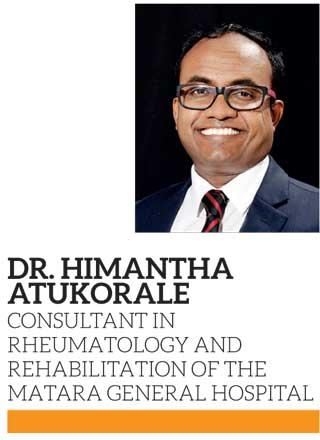03 Dec 2021 - {{hitsCtrl.values.hits}}
 As the Covid-19 threat is still lurking around the corner it is paramount to be aware of the health complications that may rise in a patient during the post Covid phase. Today’s Health Capsule would like to draw the attention to patients with osteoporosis conditions, vulnerable to complications during the post Covid period. In conversations with the Health Capsule, Consultant in Rheumatology and Rehabilitation of the Matara General Hospital, Dr. Himantha Atukorale explains how Osteoporosis could pose a challenge to patients, particularly during the Covid-19 pandemic.
As the Covid-19 threat is still lurking around the corner it is paramount to be aware of the health complications that may rise in a patient during the post Covid phase. Today’s Health Capsule would like to draw the attention to patients with osteoporosis conditions, vulnerable to complications during the post Covid period. In conversations with the Health Capsule, Consultant in Rheumatology and Rehabilitation of the Matara General Hospital, Dr. Himantha Atukorale explains how Osteoporosis could pose a challenge to patients, particularly during the Covid-19 pandemic.
What is Osteoporosis?
Explaining the condition, Dr. Atukorale said that Osteoporosis is a disease that causes brittle bones. “The bone has a protein named collagen, which forms a frame on top of which minerals are deposited to add strength. When the bone mineral density becomes low, we call this Osteoporosis. This leads to easily breakable bones” he added.
 Stating that a serious concern about Osteoporosis is its asymptomatic nature, Dr. Atukorale added that symptoms include small fractures that can happen throughout a few years without the awareness of patients. Other symptoms include spinal fractures that are not painful unless they pinch adjacent nerves. This pressure effect can give rise to severe pain. “Sometimes when multiple fractures happen in the spine, this can lead to changes in alignment. These alignment changes which are termed, kyphosis or scoliosis, can create muscle tension/pain. Osteoporosis can also cause fractures of hips and forearms after even a small fall” he said.
Stating that a serious concern about Osteoporosis is its asymptomatic nature, Dr. Atukorale added that symptoms include small fractures that can happen throughout a few years without the awareness of patients. Other symptoms include spinal fractures that are not painful unless they pinch adjacent nerves. This pressure effect can give rise to severe pain. “Sometimes when multiple fractures happen in the spine, this can lead to changes in alignment. These alignment changes which are termed, kyphosis or scoliosis, can create muscle tension/pain. Osteoporosis can also cause fractures of hips and forearms after even a small fall” he said.
Link between COVID and Osteoporosis
It is a fact that COVID has caused people to adopt sedentary behavior. Accordingly, the lock down periods and stay at home concept has an unhealthy effect on many diseases including Osteoporosis. This has resulted in diseases like osteoarthritis, diabetes, high blood pressure, elevated cholesterol levels and heart ailments being on the rise.
“One of the key reasons for a greater chance of acquiring osteoporosis is lack of exercise. Exercise is clearly known to enhance bone mineral density. Also poor choice of food might play a role here. Food which is high in sugar and lipids but have low levels of vitamin D or calcium might increase the chances of osteoporosis” the doctor noted.
Can Osteoporosis during the COVID pandemic be avoided?
While explaining that patients can stay healthy and keep their bones, joints and muscles fit by eating a healthy diet which has fewer calories and is rich in minerals and vitamin D, Dr. Atukorale further noted that home based exercises like aerobics and Zumba even for 20 - 30 minutes a day will help. “Some resort to activities like dancing, climbing stairs, skipping and brisk walking outdoors at a safe location. Exposure of skin to sunlight especially between 10.00AM and 3.00PM can enhance the production of Vitamin D within the body” he added.
Preventing Osteoporosis related complications
“The main complications are fractures, while hip and forearm fractures are disabling and need quick orthopedic cures. Fractures of the spine can cause spinal cord or nerve compression. Personally, I advise patients to avoid falls by using simple appliances like walking canes or waking frames especially if they struggle with walking. There are certain modifiable risk factors known to correct osteoporosis. These are quitting smoking, reducing alcohol intake, maintaining a good body weight and getting treatment for premature menopause” the doctor explained.
Take home message
“Be wary of osteoporosis during the COVID-era, especially if you have a family history of fractures. Females of post-menopausal age group when frail have a higher risk of osteoporosis related fractures. If walking is difficult, eyesight is poor and if there are imbalance related health problems, it is always better to seek medical advice. Do not hesitate to use a walking aid as this helps in avoiding falls” Dr. Atukorale advised.
28 Apr 2024 8 hours ago
28 Apr 2024 9 hours ago
28 Apr 2024 28 Apr 2024
28 Apr 2024 28 Apr 2024
28 Apr 2024 28 Apr 2024